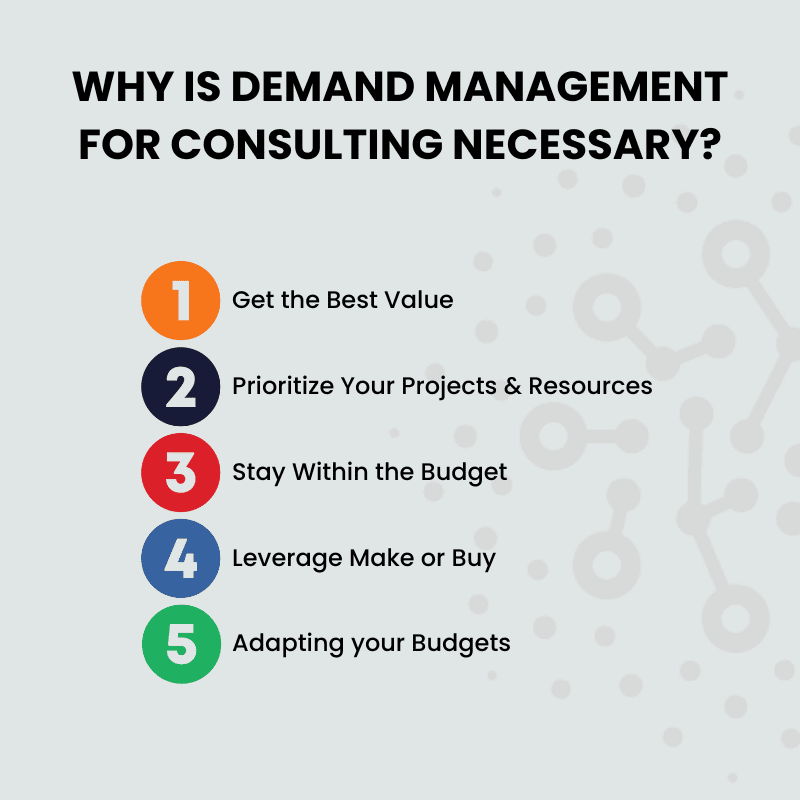Demand management is a crucial tool for procurement professionals and businesses in general. Implementing it for the consultancy category is a no-brainer if you want to maintain spend control and strategic alignment.
But how can you ensure a successful deployment of demand management for consulting? What key steps should you undertake? Look no further than the easy-to-follow steps outlined below, designed to guide your implementation of demand management effectively and seamlessly.
Why Do You Need Demand Management for Consulting?
Demand management for consulting is an essential element of running a business smoothly, particularly in the areas of inventory and resources. By managing demand, businesses can optimize their operations and have greater control over their performance, enabling them to maximize profits.
The Myriad Reasons Underscoring the Necessity of Demand Management for Consulting
#1. Get the Best Value
Many procurement executives invest considerable effort into negotiating the prices and daily rates for consulting services. They often walk away from the negotiation table with a modest 5% discount and a feeling of a job well done. But is that really a win?
Consulting firms are seasoned players. They factor in a 5% discount into their pricing models. And if you push for a bigger discount, they have a simple workaround – scale down the project’s scope or manpower.
However, reducing the project’s scope and manpower can lead to delays and diminished project value. And the thought of your project being pushed down the priority list of your consulting providers? That doesn’t seem right, does it?
So, if your aim is to achieve substantial savings, focus on controlling the flow, not just the size of the bucket. Surprisingly, nearly 47% of businesses do not implement demand management for consulting or even a make-or-buy analysis.
#2. Prioritize Your Projects and Resources
You have a list of projects to start in order to carry out your strategy, but you are aware that you cannot complete them all at once. So, what do you do? Well, you need to create an analysis grid to classify your projects according to their importance.
Impact vs. budget is frequently a fantastic place to start, but there’s nothing stopping you from using more original criteria.
#3. Stay Within the Budget
The reality is that you will be unable to complete all of the projects during the year. So, to maintain control of your spend (or the flow), you must determine how much you will spend on consulting for the time, based on where you are in your transformation (often between 0.5% and 3% of revenues).
As a general guideline, prioritize initiatives that will create immediate savings to fund subsequent initiatives. And mix them with longer-term initiatives that are necessary to advance your strategy.
In addition, you must specify how much of the budget will be allocated to strategic projects and how much will be allowed to the managers’ discretion. This way, you can keep some flexibility in the system and make it easier for your teams to accept the change.
#4. Prioritize Your Projects
Demand management for consulting fundamentally revolves around setting priorities for upcoming projects over the next few years. Hence, it’s vital to kick-start with initiatives that hold high impact and high priority.
Once you’ve allocated two-thirds of your budget, it’s time to scrutinize the remaining projects in your pipeline. Are there any low-priority or low-impact initiatives that offer immediate return on investment? Or perhaps projects that facilitate higher-priority ones? These could very well be your next priority.
#5. Leverage Make or Buy
This is the point where understanding the skills needed for each project becomes crucial. You may not have the ability to tap into or mobilize all the internal resources every time.
So, you need to figure out what can be done in-house and what needs to be outsourced for each project. Remember to also check if your budget allows for external consultants. If your budget for consulting services is limited, this may naturally narrow down your choices…
#6. Adapting Your Budgets
After distributing your resources, you might still end up with strategic projects that are not yet funded. This is where the flexibility of budgets comes into play. You may need to adjust your financial plan for the year to accommodate these vital initiatives.
Additionally, it might be worth reassessing the strategic value of some of your existing key projects. Perhaps you can trim the ‘immediate use’ budget to free up resources for one or two crucial strategic endeavors. Remember, budgets are not static; they should respond to the needs and priorities of your evolving business landscape.
Questions to Ask While Implementing Demand Management for Consulting
Asking the right questions is crucial when determining your priorities. That’s because the foundation of demand management for consulting must be a strong decision-making process that upholds the company’s strategic direction while keeping costs under control.
So, what are the right questions that you need to ask? Let’s take a look!
#A. On the Strategic Value of the Project
Understanding the strategic value of a project before venturing into it is a crucial part of demand management for consulting. It’s not just about immediate outcomes but also about long-term impacts and how it aligns with future initiatives. You’re not just spending resources on a project; you’re investing in potential growth and evolution.
Questions that you need to ask are as follows:
- Does this project support future strategic initiatives?
- What is the project’s anticipated impact?
- How much money are you prepared to spend on this project?
- What time period is ideal for this project?
- In the next three years, would these skills be required for new projects?
#B. On the Externalization Value of the Project
Appraising the externalization value of a project is another crucial step in your process. It involves conducting a make-or-buy analysis, which is also a vital part of your demand management for consulting. This analysis allows you to assess whether the skills needed for the project are better sourced in-house or should be outsourced to a consultant.
Questions that you need to ask are as follows:
- Are the skills needed for the project essential to your business?
- If you speed up the project, does that help the business case?
- Do you already have the skills and resources that are needed?
- Do you have the skills and tools needed to manage the project?
- Are there companies that can provide that service?
- Is there IP or information that is sensitive to the project?
By following these suggestions, you’ll be able to sort your tasks onto a clear-cut choice matrix. This will lead you straight to successful demand management for all your consulting needs.
Closing Thoughts
In the modern business landscape, companies often grapple with maximizing the returns on their consulting investments. Yet, the potential to supercharge their ROI lies right at their fingertips – it all starts with investing in the right project. Our ‘6 Levers‘ podcast series offers a treasure trove of insights, helping consulting buyers identify and strategically invest in projects that align with their objectives.
Our first lever zeroes in on the power of ‘the right projects.’ By implementing demand management for consulting, you can unlock this power, streamlining your focus on projects that truly matter. So, we invite you to immerse yourself in our podcast and discover the transformative potential within.
But why stop there? Schedule a demo with us today. Step into the world of strategic consulting management and witness firsthand how we can accelerate your journey to business excellence. Your next level of growth is just a decision away!
demand management for consulting demand management for consulting demand management for consulting demand management for consulting demand management for consulting
demand management for consulting demand management for consulting demand management for consulting demand management for consulting demand management for consulting

How Consource Can Help?
Consource can help you treat consulting as a strategic investment by enabling you to choose projects that align with your company’s strategy through the implementation of demand management, in addition to budget adherence and spend analysis. consource ensure optimal results and maximize ROI.









0 Comments